Ka
Kaganovich, Lazar
Undeviating Stalinist in various state and party posts. He was removed from all his posts when Khrushchev became premier of the Soviet Union in 1958.
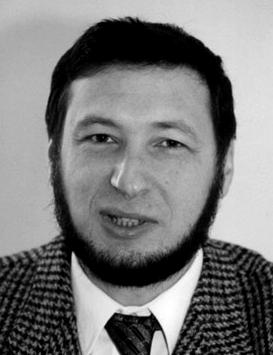
Kagarlitsky, Boris (b. 1958)
Imprisoned 1982 for opposition to the Soviet Union. Coordinator of the Moscow Popular Front for Perestroika in 1990. Leading member of the Soviet Left and well-known Soviet Marxist outside of Russia; founding member of the Party of Labour, member of the Moscow City Council.
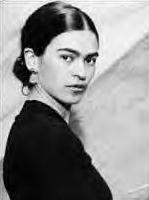
Kahlo, Frida (1907-1954)
Born and brought up in Coyoacan, Mexico. Kahlo got polio at age of seven, and suffered a terrible accident when she was 18, the painful effects of which she suffered throughout her life. A prominent artist, her only public exhibition was in 1953, shortly before her death. In 1929 she married the famous muralist, Diego Rivera, who had joined the Fourth International in 1936. In January 1937, Trotsky and Natalia came to Coyoacan, where Rivera rented Trotsky a house. Trotsky and Kahlo had a brief love affair in 1937. Rivera co-authored the Manifesto Towards a Free Revolutionary Art with Andre Breton and Trotsky in 1938. In January 1939, under intense pressure from his fellow-artists, Rivera resigned from the FI. Trotsky broke off relations with Rivera, but tried to retain Frida Kahlo's support. Frida resisted pressure to denounce Trotsky, until rejoining the CP in 1948, eight years after Trotsky's assassination in Mexico.
Kaledin, General Alexis
A Russian aristocrat, a General of the Tsarist 8th Army. Dismissed May 1917. In July of 1917 the Don Cossaks elected General Kaledin their ataman (chief). Six months following, Kaledin created an alliance with Alekseev and Kornilov withdrawing 9 million rubles from his Bank account to assist in the building of Alekseev's "volunteer" army. The Don Cossaks were enraged feeling that Kaledin had betrayed their cause to the White armies. Kaledin, immersed in guilt, responded by putting a bullet in his head, February 1918.
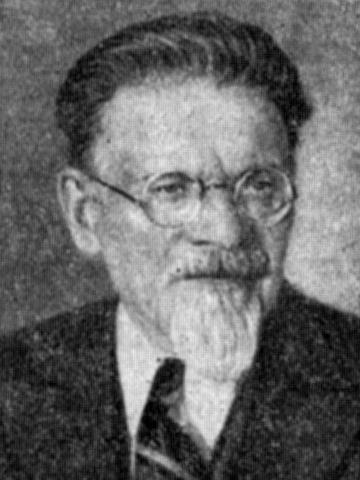
Kalinin, Mikhail (1875-1946)
Old Bolshevik, was elected president of the Soviet Central Executive Committee in place of Yakov Sverdlov, in 1919.
Kamenev, Leon (1883-1936)
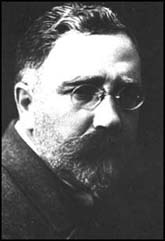
Founding member of the RSDLP, and after the break up, a Bolshevik and old friend of Lenin.
Returned from exile in 1914 to edit Pravda but was arrested; released by the February 1917 revolution, and elected to Bolshevik Central Committee. Together with Zinoviev, Kamenev opposed the plans for the October revolution. Their opposition was defeated in a vote by the majority of the party, to which they responded on the 18th of October, writing for Novaya Zhizn (a Menshevik daily), of the Bolshevik plan for an uprising against the government, and expressed their opinions that it was doomed.
On the day after the revolution, Kamenev was elected as chairman of the Central Executive Committee by the Second Congress of Soviets, and later was one of the first members of the politburo in 1919. In 1923 Kamenev joined Stalin and Zinoviev forming the triumvirate (troika) against Trotskyism. Three years following Kamenev formed a bloc with Trotsky against Stalinism, due to its excessive bureaucatism, in the Left Opposition, 1926-27.
As a result, Kamenev was expelled from the Communist party in 1927. Kamenev pleaded to be allowed back into the party and was readmitted in 1928. In 1932, Kamenev was expelled once again, but again pleaded with Stalin to be readmitted, and was. Shortly three years following, Kamenev was sentenced to ten years imprisonment for conspiracy to assasinate Stalin. During the beginning of the Moscow trials in 1936 Kamenev was again tried, now for treason against the Soviet State, and was shot.
Kamenka, Eugene (1928-1995)
Eugene Kamenka was born in Cologne in 1928 and taken to Australia in 1937. He was educated at the Sydney Technical High School, and went on to take first-class honours in philosophy at the University of Sydney under John Anderson. His doctoral thesis, The Ethical Foundations of Marxism, for the Australian National University, was published in 1962. Kamenka has lectured in philosophy at the University of Singapore and has lectured and reaearched in Europe, North America and most countries in Asia; he was Professor and Head of the History of Ideas at the Institute of Advanced Studies of the Australian National University, and lived in Canberra. His other works include Marxism and Ethics (1969), The Philosophy of Ludwig Feuerbach (1970), The Portable Karl Marx (1983), Bureaucracy (1989), and many others.
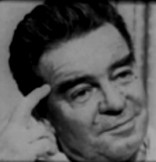
Kangrga, Milan (1923-2008)
Croat philosopher, one of the leading thinkers of the Praxis Group. He was expelled from the League of Communists of Yugoslavia in 1954 for claiming that he was inspired to become a communist by the works of Miroslav Krlea, who then wasn’t wholly rehabilitated by the regime. In the period 1964-1975 he was one of the most important figures behind the “Praxis” journal. Kangrga has remained critical towards the Yugoslav communist regime the whole time until the breakdown of former Yugoslavia, arguing that it had failed to introduce genuine self-management socialism. However, he was and still is also critical towards non-socialist reactions to the regime. Thus, he was one of the few Croat intellectuals who opposed the so called Croat Spring of 1971.
Kangrga major works include: The Ethical Problem in the Karl Marx’s Works (1963), Ethics and Liberty (1966), The Meaning of the Historical (1970), The Man and the World (1975), Ethics or Revolution (1983), Praxis-Time-World (1984), Hegel-Marx: some basic problems of Marxism (1988), The Meaning and the Reality (1989), Nationalism and Democracy (2002), Ethics: the basic problems and tendencies (2004).
He died in April 2008.
Zdravko Saveski

Kant, Immanuel (1724-1804)
German philosopher and scientist; as a scientist developed ideas of the evolution of solar system from a gaseous nebular, retardation of Earth's rotation by the tides, the concept of a Universe composed of Galaxies, thus playing important role in shaping the view of Nature as developing according to its own processes. In philosophy he was the founder of the "Critical Philosophy"; immediate precursor of Hegel. Kant confronted the problem posed by Hume showing that if knowledge could only be derived from experience, then in fact there could be no knowledge of a world "beyond sensation" - and yet positive knowledge clearly did exist. In studying the forms of cognition and its limits, Kant developed a philosophy riddled with contradictions which provided the material upon which Hegel was able to build. Kant held that "things-in-themselves" (beyond sensation) were in principle unknowable - only "phenomena" are knowable. Showing that opposite propositions about the nature of reality can be proved, Kant held that these contradictions are only "seeming" and knowledge of "things-in-themselves" is accessible only by Faith. The influence of Kant is still far more extensive than that of Hegel among today's philosophers and social theorists.
The philosophical world into which Immanuel Kant entered was one riven by apparently irresolvable contradictions. The period from Kant's beginning work on his major work, Critique of Pure Reason, in 1769 and the publication of its authoritative second edition in 1787 was the period of the immediate gestation of the French Revolution. But the Revolution was not bringing forth a clear new philosophical view of the world. On the contrary, supporters of the Revolution adhered to divers schools of philosophy, hardly even able to speak the same philosophical language.
Kant lived in the Prussia of Frederick the Great, an absolutist monarch who raised Prussia to the status of a European power in which the arts and sciences flourished, but where politcal life was virtually totally absent. A contemporary of Goethe, the great composer, scientist and philosopher, Kant was in his earlier years also absorbed with scientific problems and developed important ideas of the evolution of the Solar System, Galaxies, and the retardation of the rotation of the Earth by the tides. During this period he tended towards empiricism and was influenced by the Scepticism of David Hume.
However, from when he began work on what was to become the Critique of Pure Reason (his later works were Critique of Practical Reason and Critique of Judgment), Kant became intensely dissatisfied with the state of war which seemed to exist in philosophy, and took upon himself the task of resolving this conflict.
Three readings from the Critique of Pure Reason are included in the Reference Archive:
From the last section, Transcendental Doctrine of Method, a short piece is included which gives a glimpse of the genesis of Kant's views, including a concise criticism of his former mentor, David Hume: The Impossibility of a Sceptical Satisfaction of Pure Reason.
From the Introduction, the opening pages, in which Kant unfolds the principle concepts of his system: synthetic and analytic judgments, a priori and a posteriori, etc.: Of the difference between Pure and Empirical Knowledge.
From about a quarter of the way through the Critique, the section entitled Transcendental Deduction of the Pure Concepts of the Understanding, where the consequences, so to speak, of Kant's approach are brought out. For instance, you might look at the section entitled: The Category has no other Application in Knowledge than to Objects of Experience.
Kant's achievement was enormous: he established a system of categories and concepts of philosophy which was the basis for the stunning development of Classical German Philosophy (Kant, Fichte, Schelling, Hegel and Feuerbach) and later Marxism over the 50 years following the Critique of Pure Reason, and it remains the point of reference for all schools of philosophy which pretend to the status of science, up to the present.
In focussing attention of the Categories of knowledge, Kant set the direction and provided invaluable tools for the resolution of the crisis of philosophy which he attempted, even if he did not himself achieve this resolution.
See Hegel on Kant in his History of Philosophy, Hegel's assessment of Kant in the footnote in the Science of Logic, extended critique of Kant in The Critical Philosophy and other assessements in the sampler.
Further Reading: Critique of Pure Reason.
Kant is possibly even more influential today as a result of his Moral Philosophy. See Kant Archive.
Karalasingham, Vaithianathan (1921– 83)
Party pseudonyms: V.S. Roy, Sobhana Roy
Nickname: Carlo
Born Jaffna, Ceylon, son of a government civil servant, younger brother of V. Balasingham (see Biographical Note above). Educated Kalutara and Ananda College. Joined Lanka Sama Samaja Party, 1937. Sent to India in late 1941. Founding member, Bolshevik Leninist Party of India, 1942. Editor, Permanent Revolution , 1943-45. Arrested in Bombay, March 1945. Secretary, BLPI Ceylon Unit, 1945. Editorial Board, New Spark , 1947-48. Delegate to BLPI conferences, 1944, 1947, 1948. Central Committee, BLPI, 1947-48. Returned to Ceylon, 1951. Delegate to Third World Congress of Fourth International, 1951. Studied law in UK, 1952-58. Collaborated with the Trotskyist tendency in the Labour Party led by Ted Grant. Became Advocate of the Supreme Court. Founding member, Lanka Sama Samaja Party (Revolutionary), 1964. Editorial Board, State , in the 1970s. Rejoined LSSP, 1966. Ran for Parliament, March 1960, 1965, and 1970 (lost all). Director, Air Ceylon during SLFP coalition government, 1970-75. Author: The War in Korea (1950), Politics of Coalition (1964), Senile leftism: A Reply to Edmund Samarakkody (1966), Czechoslovakia, 1968 (1968), The Way Out for the Tamil Speaking People (1963), and Enter History (1970).
Compiled by Charles Wesley Ervin
Karkal, Ramanath Pandurang (“Ramesh”) (1926– 2003)
Born Karkal (Karkala Taluk, Karnataka). Went to Bombay and joined the freedom movement at age 15; participated in the Quit India struggle. Jailed, 1942-45. Educated Victoria Jubilee Technical Institute in Bombay. Joined Bolshevik Leninist Party of India. Bombay Unit Secretary, Bolshevik Leninist Party of India, 1947. Published reprints of Trotsky’s pamphlets. Entered SP with BLPI, 1948. Contributed to SP publications. Formed Modern India Publications to reprint numerous works by Trotsky in the early 1950s. Supported the Trotskyist movement until his death.
Compiled by Charles Wesley Ervin
Katz, Ivan (1889–1956) .
Son of businessman, higher technical studies. In Socialist Youth in 1906, worked as metal-worker for one year, then as assistant in how and economics college. Member of SPD (Sozialistische Partei Deutschlands, Social-Democratic Party) before War, remained there until end of 1919, when he joined USPD. In VKDP (Vereinigte Kommunistische Partei Deutschlands/United Communist Party of Germany) in 1920, leader of ‘communes’ department attached to Zentrale in 1922, supporter of Left. Member of Politbureau in 1924, then delegate to Moscow. Organised ultra-left opposition in 1925, expelled in January 1926. Arrested in 1934, set free, again arrested in 1940, escaped and lived illegally until 1940, arrested and deported to Auschwitz. After war spent short time in KPD and SED, in 1950 founded ‘Titoite’ party.
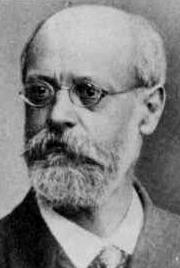
Karl Kautsky (1854-1938)
Karl Kautsky (16 October 1854-17 October 1938), was one of the best-known theoreticians of the Second International and until 1914 he was thought by many socialists to be the veritable “Pope of Marxism.”
Karl Kautsky was born in 1854 in Prague, the son of an Austrian mother and a Czech father. His father, Johann Kautsky, was a painter and his mother, Minna Jaich Kautsky, a novelist and actress whose novels were admired by Engels. The family moved to Vienna when he was seven years old and after the elite Vienna Gymnasium (Grammar School) he attended the University of Vienna in 1874, joining the Austrian Social Democratic party in 1875 and working as a journalist for them. In 1880 he joined a group of German socialists in Zurich who were supported financially by Karl Höchberg and who smuggled socialist material into the Reich at the time of the Anti-Socialist Laws. Influenced by Eduard Bernstein, Höchberg’s secretary, he became a Marxist and in 1881 visited Marx and Engels in England.
In 1883 he founded the monthly Die Neue Zeit in Stuttgart which became a weekly in 1890 and was its editor until 1917. The journal became immensely influential intellectually in socialist circles both in Germany and internationally. From 1885 to 1890 he worked with Engels in London and while there he published Karl Marx’ ökonomische Lehren, later translated in 1925 as The Economic Doctrines of Karl Marx which was probably the most widely read Marxist work on economics among SDP activists. It was so influential that long after Lenin had denounced him as a renegade it was still being used at the Moscow Lenin School in 1931 as by far the best treatment of the subject. Unfortunately his work on the French Revolution, Die Klassengegensätze von 1789 (1889, 2nd ed. 1908), written at the same time, has never been translated into English.
He went back to Vienna in 1890 where he married his second wife Luise Ronsperger (1864-1944) who was later to die in Auschwitz and, after the repeal of the German Anti-Socialist Law, they went to live in Stuttgart. His draft of the SPD programme, approved by Engels, was accepted at the Erfurt Congress in 1891 and became another of his highly influential publications and at least three different translations into English were made of it. He started to develop a Socialist agrarian programme. His main work on this, The Agrarian Question, has only been recently translated (1998) and is still in copyright so not available here on the MIA. After the death of Engels, to whom he was closer than he had been to Marx, he wrote a warm tribute to him.
In 1896 he polemicised with Belfort Bax on the Marxist conception of history and in 1897 moved with his family to Berlin and in a series of articles in his paper called for participation of the SPD in the Prussian elections despite the disgracefully undemocratic constitution. The electoral process could be used a tribune to raise the consciousness of the workers and recruit them to socialism. In 1898 he took up the question of colonialism and the nationalities question in Austria. On colonialism he was one of the first Marxists to see its importance and to take an intransigent stand against it. When Bernstein attacked the traditional Marxist position in the later 1890s, later translated as Evolutionary Socialism (1908) Kautsky denounced him in articles and in an important book, Bernstein und das sozialdemokratische Programm, Stuttgart, 1899. Again there is no English translation of this very important work though there is a French one, Le Marxisme et son critique Bernstein. Kautsky correctly perceived that Bernstein’s emphasis on the ethical foundations of Socialism opened the road to a call for an alliance with the “progressive” bourgoisie and a non-class approach though in fact Bernstein’s approach to colonial questions would not strike many people today as excessively ethical. Kautsky thus appeared as the intellectual leader of the revolutionary left wing of the SPD though the growth of the Trade Union fraction was making the party more and more inclined to reformism. However it takes two to tango and the Imperial and Prussian governments showed not the slightest inclination to yield to democratic pressure from an opposition with the mildest of demands. In that situation it was possible for Kautsky to maintain his revolutionary credentials since there was little prospect of a viable reformist current in Wilhemine Germany. Above all Kautsky was opposed to non-working class alliances in the Imperial German situation.
In 1901 he handed over his ownership of Die Neue Zeit to the SPD while remaining editor. As an internationalist he opposed Socialist support for foreign tariffs and protection which he felt was at the expense of working class living standards. The SPD was less successful in influencing the Catholic than the Protestant working class and so he analysed the reactionary policies of the Catholic Church. In 1904 and 1905, under the influence of Russian events, Kautsky, although far more cautious than Rosa Luxemburg, argued against the SPD right wing that the whole question of the mass strike should be studied and not dismissed. However he never advocated such a mass strike in any specific situation – his demand that it should be considered as an option remained quite abstract though in theory he advocated a joint parliamentary and direct action approach in the Imperial German state to press for democratic reforms with the proviso that such action should have a good chance of success. At the Congress of the Second International at Stuttgart in 1907 he successfully attacked the pro-colonialist faction. The Foundations of Christianity was written in 1908. Der Weg zur Macht, (1909) translated as The Road To Power, and praised by Lenin, is sometimes thought to be his most “revolutionary” work. There is a poorer older version but an excellent new translation by Meyer (1996) exists which it is still in copyright and is available in many libraries.
Up to the outbreak of World War One, in addition to writing on themes already mentioned, he dealt with new questions such as anti-Semitism and inflation as well as articles on Finance Capital, Imperialism and national rivalries together with improved scholarly editions of Marx. His theories on imperialism, for over time his position changed, differed somewhat from that of Lenin. In particular he did not seem to believe that imperialism would drive to war, rather he saw it as a reactionary social phenomenon which appealed to the decaying class of the aristocracy and some marginal capitalist ones and was doomed. Only a fraction of the great mass of articles that he had written up to this point were translated into English and since many of the analyses were brilliant, even if he had much less to say on tactics, they deserve to be made available to a larger international audience as only through the medium of English can the largest number of people be reached today.
In 1914 the crisis struck and war was declared. At the meeting of the Reichstag caucus on 3 August 1914 which decided to vote for the war credits next day, Kautsky, not a member of the Reichstag himself, stated that the character of the war could not be determined, and therefore the right to defence of the fatherland had to apply to all countries involved in the war. He wanted the Party to demand from the government an assurance that it wanted no conquests, and if the government agreed the war credits should be approved, if not, not. This course of action was clearly utopian. He was utterly unprepared for the horror as he had increasingly tended to believe, as his pre-war theories of “Ultra Imperialism” suggest, that capitalism was sufficiently rational not to go to war. In June 1915, about ten months the war had began and when it had become obvious that this was going to be long sustained and appallingly costly struggle, he issued an appeal with Bernstein and Haase against the right and denounced the government’s annexationist aims. The SPD was dominated by its pro-war and Trade Union wing and tried to muzzle him so eventually Kautsky reluctantly split in 1917 and, together with Bernstein and Haase, joined the USPD as its right wing. In June 1917, after the first revolution in Russia he stated that this should lead to democracy but not to socialism since Russia was too undeveloped economically so Socialism would have to wait. In September 1917 the SPD dismissed him as editor of Die Neue Zeit. By this time he was becoming a more marginal figure as the “storm of the world” was crushing the SPD “centre” and strengthening the left of Luxemburg and Liebknecht. The collapse of the Imperial state in 1918 through military defeat and immense working class privation threw up a real revolutionary situation for which he was quite unprepared theoretically.
Soon after the Bolshevik revolution he denounced, in the The Dictatorship of the Proletariat (1918), all attempts to bring socialism forcibly to backward societies like Russia but he served as under-secretary of State in the Foreign Office in the short lived SPD-USPD government revolutionary government and worked at finding documents which proved the war guilt of Imperial Germany (Die Deutschen dokumente zum Kriegsausbruch ..., 1919, The Guilt of Wilhelm Hohenzollern, also 1919). In response to Lenin’s accusations of being a renegade he wrote Terrorism and Communism in 1919.
After 1919 he became steadily less important. He visited Georgia in 1920 and wrote a book in 1921 on this Social Democratic country still independent of Soviet Russia and in 1920, when the USPD split, with a minority of that party he went back into the SPD. At the age of 70 he moved back to Vienna with his family in 1924 where he remained until 1938. In that period he continued his scholarship on the letters of Engels and his criticisms of Soviet Russia seeing that country as doomed by its inherent backwardness. He wrote something on Fascism after 1933 but he was also critical of the workers rising against Dollfuss in Vienna in 1934 but published his views anonymously and thus wrote about the Nazis in 1934 that “we should guard against overestimating the superiority of Hitler’s power” and that when capitalist democracy is threatened “we do not in any way regard ourselves as driven to the necessity of answering the destruction of democracy by an armed insurrection.”
In 1938 he fled to Czechoslovakia at the time of Hitler’s Anschluss, and thence by plane to Amsterdam where he died in the same year. His memoirs, on which he was working were only completed up to 1883 and were published posthumously in 1960.
See: Kautsky Archive
Further Reading:
Carl Schorske, German Social Democracy 1905-1917 – The development of the Great Schism, Harvard Historical Studies, Harper and Torchbooks 1954.
Dick Geary, Karl Kautsky, Manchester University Press, 1987.
John H. Kautsky, “Karl Kautsky” in International Encyclopaedia of the Social Sciences, Vol. 8, 1968
Kautsky, Minna (1837-1912)
German writer of novels. Mother of Karl Kautsky.
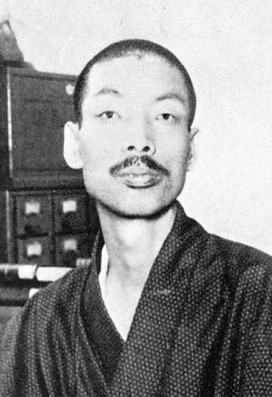
Kawakami, Hajime (1879-1946)
A pioneer of Marxist political economy in Japan. Kawakami studied political science at Tokyo Imperial University at the turn of the century. Kawakami only began to consider himself a Marxist at the beginning of the 1920s, after teaching bourgeois economics at his alma mater for nearly two decades, apart from a short fling with a religious sect around 1905. In 1917, at the beginning of what he described as his “slow motion” conversion to Marxism, Kawakami wrote a series of articles on the question of poverty, entitled Bimbō monogatari (Tale of Poverty), which created a sensation at the time and established him as an influential author. Criticisms of this book by Marxists, combined with the impact of the Rice Riots in Japan and the Russian Revolution, encouraged Kawakami to question his own assumptions and study Marx more earnestly. In the 1920s Kawakami presented his new, Marxist views in his journal Research on Social Problems. In the course of the decade he would produce an astounding volume of articles, pamphlets, and books on Marxist political economy. He resigned from his position at Kyoto Imperial University to become actively involved in the Communist movement. Eventually he was arrested for his activities and spent the years 1933 to 1937 in prison. Upon release, Kawakami spent his remaining years working on his memoirs and writing poetry.
See Kawakami Biography and Marxist Political Economy as a Science.
Kavanagh, Jack (1879-1964)
Born in Ireland 1879. Fought for the British in the Boer War; emigrated to Canada in 1907 and joined the Socialist Party of Canada; in 1918 President of British Columbia Federation of Labour, and an OBU organiser. Expelled from SP in 1919. By 1922 an Executive Committee member of the Communist Party and editor of its paper. Came to Australia in 1925, and became leader of the CPA which was at its lowest ebb at the time. Under Kavanagh's leadership the CPA tried to except the NSW Labour Council and ALP from application of the 'social fascist' policy. A relatively open discussion was conducted in the pages of Workers Weekly on the subject. Herbert Moxon and Lance Sharkey received Comintern support to overthrow Kavanagh. Kavanagh was expelled in 1934, when he joined the Trotskyists, and was active as a Trotskyist until during the War. He was active in pensioners organisations until his death in 1964.
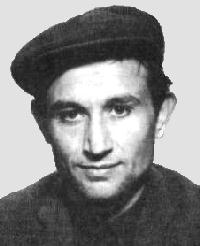
Kaypakkaya, Ibrahim (1949-1973)
The founder of the Communist Party of Turkey-Marxist Leninist (TKP-ML) and the Worker Peasant Liberation Army of Turkey (TIKKO).
During his university education he joined Federation of the Clubs of Ideas (FKF, later Revolutionary Youth, DEV-GENC). He advocated the thesis of the "National Democratic Revolution" and took up a position with the Maoist wing of DEV-GENC. The Maoist Wing (Proleter Devrimci Aydinlik, PDA) became later the Revolutionary Worker Peasant Party of Turkey (TIIKP), but Kaypakkaya and his comrades split up from the Party and found the TKP-ML and TIKKO. They appropriated the armed struggle and guerilla actions and developed the strategy of a People's War. In January 1973 after combat he was wounded and arrested while another leader of the movement, Ali Haydar Yildiz, was killed. After a long torture period he was killed under arrest on 18 May 1973. Ever since he has become a symbol of heroic resistance under torture.